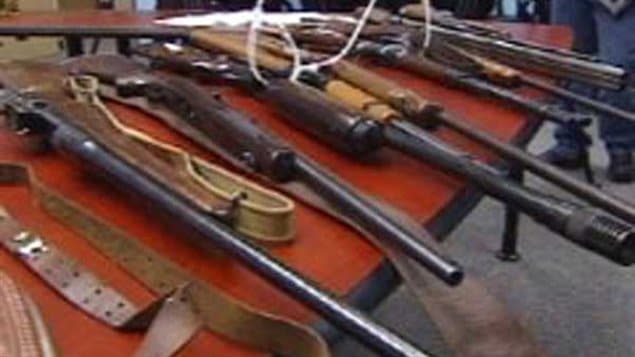In June, the western province of British Columbia will begin a month-long amnesty programme for people to turn in unwanted and unauthorized firearms.
The provincial government, which announced the amnesty in February, says this will help remove guns from communities, and reduce risk of them falling into the hands of criminals.
However, police know the gun amnesty program likely won’t have any effect on the current levels of drug violence according to Rob Gordon, the head of Simon Fraser University’s school of criminology. He says, “If people want to get rid of those weapons they will go to a bridge over a river and toss those weapons in – they won’t go to police.”
Police say they will destroy all guns that are turned in.
However there are other critics of the programme.
Firearms collectors agree that criminals are highly unlikely to turn in guns, which almost always involve modern handguns. Collectors say that the type of firearms turned in are mostly inherited guns which could include valuable historical artifacts which should not be destroyed.
Ron Tyson, president of the Historical Arms Collectors Society of B.C., supports the principle of a gun amnesty surrender, but says most crimes aren’t committed with century-old Winchesters.
“I think, with any firearm… they should get some knowledgeable advice on it before they turn it in,” Tyson said.
Linda Haynes-Baggaley, of Bud Haynes & Co. Auctioneers in Red Deer Saskatchewan, a long time firearms auction house, says she is already fielding questions out of B.C. ahead of next month’s amnesty, These question include whether an old German pistol brought back from the Second World War might be worth something.
“A German Luger, in fact, can run anywhere from $600 to $2,000 depending on what it is,” she said.
She says many people turn in historic firearms they’ve inherited because they’re afraid of breaking the law. She says in spite of being told they can sell the firearm, people panic and have it destroyed out of fear of police and prosecution.
In a 2006 amnesty, police in the province say more than 3,000 firearms were turned in.
While these are often simply old hunting rifles, small .22cal rifles, or shotguns, occasionally historically important Canadian-made Bren or Sten guns show up, along with others such as Webley revolvers, Inglis, Luger or Walther pistols brought back from the Second World War or purchased legally post-war. Sometimes even older and more rare firearms are turned in. In the prairie province of Alberta during a 2006 amnesty, a woman in Calgary reported that an officer would not accept her surrendered guns, but then came back when off-duty to buy them for himself.
Collectors were also incensed when the federal government announced in 2011 that it would replace some 19,000 service pistols still in use by the Department of Defence. These were made by Inglis in Canada during the second world war and have similar value to that of German Lugers. The government says it will destroy the guns. Collectors say that the government should sell these historically significant guns to help pay for the replacement firearms rather have the pistols destroyed at great cost in addition to losing the income of millions of dollars in sales.







For reasons beyond our control, and for an undetermined period of time, our comment section is now closed. However, our social networks remain open to your contributions.